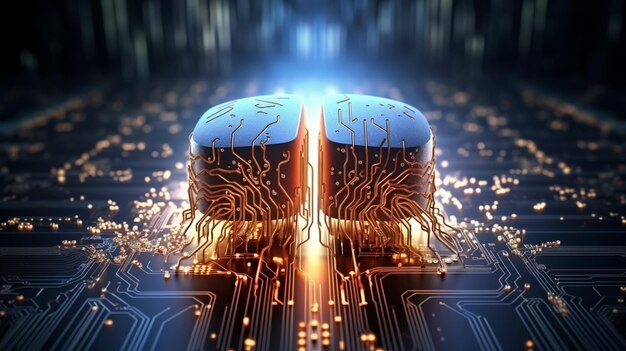Key Concepts :
Qubits: Classical bits can be either 0 or 1. Qubits, on the other hand, can exist in a mix of states. This allows them to stand for both 0 and 1 at the same time. As a result, quantum computers can do many calculations at once.
Entanglement: Qubits can link up. This means the state of one qubit ties to another’s state, no matter how far apart they are. This feature helps to solve complex problems more .
Quantum Gates: These work like classical logic gates but for qubits. They change qubits to create quantum circuits. These circuits can then tackle complex problems.
Quantum Speedup: Some quantum algorithms work faster than their classical versions. Shor’s algorithm breaks down big numbers. Grover’s algorithm searches unorganized data. These show how quantum computing might speed up certain tasks by a lot.
Potential Applications :
Cryptography: Quantum computers might crack existing encryption systems spurring the creation of quantum-proof security methods.
Drug Discovery: Quantum computing has the potential to speed up the process of finding new medicines and materials by modeling how molecules interact at the quantum scale.
Optimization Problems: Fields such as logistics, finance, and manufacturing could reap the benefits of quantum algorithms to tackle complex optimization challenges more efficiently.
Machine Learning: Quantum computing might boost machine learning algorithms. This could make them faster and more productive when they handle big datasets.
Climate Modeling: Quantum simulations could offer more precise models of complex systems. This would help climate research and environmental science.
Challenges
Error Rates: Quantum systems tend to make mistakes because of decoherence and other quantum noise. This means experts need to come up with ways to fix these errors.
Scalability: To build quantum computers that can handle more tasks, engineers face a big hurdle. They need to increase the number of qubits while keeping them working together .
Accessibility: Right now, not many people can use quantum computers. You’ll find them in special research labs or through online cloud services.

- Quantum Mechanics Principles:
Superposition: Qubits can be in many states at the same time. This lets quantum computers check lots of answers all at once.
Entanglement: Qubits link up in a special way. This connection helps them share info right away making quantum operations faster and stronger.
Quantum Interference: Quantum algorithms use wave-like patterns. These patterns boost the right answers and get rid of the wrong ones.
- Quantum Algorithms:
Shor’s Algorithm: This algorithm has a significant impact on factoring large integers. It poses a threat to classical encryption methods RSA, which depends on the challenge of factoring.
Grover’s Algorithm: It brings about a quadratic speedup to unstructured search problems. This cuts down the time needed to locate an item in an unsorted database from O(N) to O(√N).
Quantum Approximate Optimization Algorithm (QAOA): Experts designed this algorithm to solve combinatorial optimization problems. It can provide approximate solutions more than classical methods.
- Quantum Hardware: Superconducting Qubits: Engineers make these qubits from superconducting circuits. They cool them to temperatures close to absolute zero. This allows them to work with minimal noise. Trapped Ions: Scientists trap ions with electromagnetic fields. They control them using lasers. This approach offers high accuracy and long-lasting coherence. Topological Qubits: This method shows promise but remains in the research phase. It aims to use anyons (quasiparticles) to create qubits that stand up better to errors.
- Quantum Error Correction: Decoherence and noise make error correction crucial. Researchers are developing techniques like surface codes and concatenated codes. These methods aim to protect quantum information. This protection allows for dependable quantum computation.
- Impacts on Different Fields:
- Finance:
- Quantum computing has an impact on trading strategies, risk analysis, and portfolio management by boosting data processing power.
- It can make financial model simulations much better giving us a clearer picture of how markets work.
- Healthcare:
- In drug discovery, quantum computers can model how molecules interact more , which might speed up and cut costs in bringing new drugs to market.
- It could make personalized medicine better by looking at genetic data to create treatments that fit each patient.
- Telecommunications:
- Quantum key distribution (QKD) offers a way to make communications safe by using quantum mechanics principles to spot eavesdropping.
- Energy:
- Smart power grids and more effective renewable energy sources can be created using advanced quantum algorithms to manage energy better.
- Artificial Intelligence:
- Quantum computing has an impact on machine learning algorithms making them faster to train and more accurate in their predictions and classifications.

Future Outlook
- Scalability and Practicality:
- Building a practical large-scale quantum computer stays a main objective. Scientists focus on boosting qubit numbers while keeping error rates low.
- Interdisciplinary Collaboration:
- The quantum computing future needs teamwork among physicists, computer experts, engineers, and industry pros to tackle current problems.
- Ethical Considerations:
- As quantum computing grows, we must deal with ethical issues about data safety and privacy.
- Integration with Classical Systems:
- We might see hybrid setups that mix quantum and classical computing resources. This could help businesses use quantum features without switching to quantum systems.
- Long-term Impact:
- Quantum computing is set to cause a revolution in industries by making breakthroughs possible in many fields. The power to crack problems that regular computers can’t handle could spark new ideas that change our approach to technology and science.
Conclusion:
Quantum computing brings about a major change in how we compute things. It has the potential to solve tricky problems and open up new chances in many areas. We still face big hurdles in making it work on a large scale fixing errors, and finding real-world uses. But ongoing research and new ideas keep pushing what we can do. As we move forward, quantum computing will do more than just theory stuff. It’ll shape how tech, business, and society look in the future.


